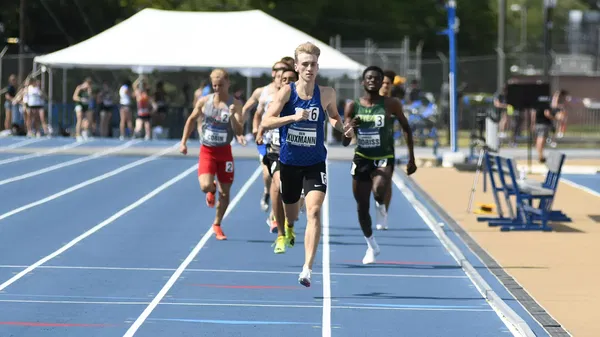

The National Collegiate Athletic Association (NCAA) is a non-profit organization that governs and supports athletes during their college days as sportspeople. Here’s a mind-boggling statistic for you: Over 57,661 people participate annually in the NCAA’s 90 championships in 24 sports across three divisions, representing 19,886 teams and nearly half a million collegiate athletes. As all the decisions are to be taken by the board, their recent one about the total number of years has sparked controversy.
The NCAA’s latest potential decision has sparked a wave of criticism among fans. Generally, athletes have only had four years (plus one as a graduate transfer) in college to play for their respective sports, but this new step may increase the time frame. According to CBS Sports college basketball insider Jon Rothstein, the NCAA is considering five years of eligibility for all sports.
Jon Rothstein shared a post on X and shared the news with fans; the post reads, “The NCAA is considering allowing five years of eligibility for players in all sports moving forward, per an NCAA official. The topic will continue to be discussed in early 2025.” The fans seem unhappy with the NCAA’s decision. However, there is no confirmation from the organization yet.
ADVERTISEMENT
Article continues below this ad
The NCAA is considering allowing five years of eligibility for players in all sports moving forward, per an NCAA official.
The topic will continue to be discussed in early 2025.
— Jon Rothstein (@JonRothstein) January 3, 2025
The college is ideal for four years, and it gives students a chance to focus on their careers while completing their graduation. That’s why the NCAA years were going well and made sense. But this new decision will surely create problems, and do you think it makes sense that athletes compete in a collegiate sport after their college is over? It will not be very feasible to fight against super seniors. But how did this decision come into the picture?
This decision was probably taken because Vanderbilt quarterback Diego Pavia sued to have two years of extra eligibility, and they successfully won the case. What was the case exactly? Diego Pavia, who is a footballer, played for two years at the New Mexico Military Institute (a junior college), and he wanted to have extra eligibility.
Now, with new lawsuits, junior college players will first train themselves for a few years and then compete for Division I. Fans are on fire after knowing this decision of the NCAA, with very few in favor.
NCAA fans and followers are not happy with the decision and are slamming NCAA
ADVERTISEMENT
Article continues below this ad
Fans fear that this change may create a situation where young and old athletes compete against each other, which is not okay. As one fan wrote, “Oh god no. It’s ridiculous as it is right now with 18-year-olds playing against 23-year-olds. They are called 4-year institutions for a reason.” Another comment on the post reads, “Gonna start having 30-year-olds playing 18-year-olds. Can’t imagine how this will go wrong 🤦🏼♂️.” This comment shows frustration about how a first-year fresher will have to compete against much older players, which is not fair in sports.
Another frustrated user wrote, “This is such a frustrating decision; this will ruin college sports for good. I hope these make sense and do not make this decision.” Again, this will be unfair, as the age gap makes a huge difference in terms of experience, technicalities of sports, stamina, and whatnot. One user even explained, “A kid can reclass, go juco for two years, and then stay on campus a minimum of five years barring some type of redshirt year. Kids are literally going to be 25, 26, or 27 years old playing college.” It is not only the eligibility, but this decision has many loopholes, and it can fundamentally alter the essence of college sports.
One fandom requested that the NCAA not implement the decision with all their heart, “Please, please, please limit transfers. 5 times will be even more ridiculous.” One comment reads, “The NCAA once again leaving no bad idea behind.” It is not the first time the NCAA has done something like this. Previously, the organization limited NIL negotiations and also prohibited athletes from being paid for their work or seeking other compensation, such as endorsement deals.
ADVERTISEMENT
Article continues below this ad
One sports lover wrote, “So now they can do Juco for 2 years, and y’all are trying to give them 5 years at a 4-year!! Along with doing postgrad, as a senior, some people will be 26-27, which are some individual’s prime years, lol.” JUCO is a junior college two-year athletic and academic program, and after completing JUCO, one will go for a four-year degree.
This is not feasible for a young athlete of around 18 years to compete against a 26-year senior, and that’s the major reason that netizens are not in support of this decision. Hopefully, the NCAA does not work on the idea further. What is your take on this new rule? Tell us in the comments section.
Have something to say?
Let the world know your perspective.
ADVERTISEMENT
Debate
Is it fair for 18-year-olds to compete against 26-year-old 'super seniors' in college sports?
ADVERTISEMENT
ADVERTISEMENT



What’s your perspective on:
Is it fair for 18-year-olds to compete against 26-year-old 'super seniors' in college sports?
Have an interesting take?